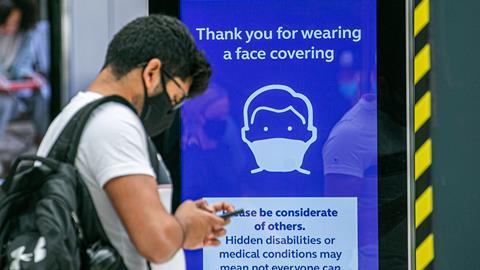Practitioners are being reminded to wear face masks in court as coronavirus cases continue to surge across the country.
A July notice from senior presiding judge Kate Thirlwall and deputy senior presiding judge Charles Haddon-Cave requesting judges and magistrates to ‘strongly encourage’ everyone in court to wear face masks has been reissued.
They say judges and magistrates ‘should continue to strongly encourage the wearing of masks/face coverings by everyone in the courtroom except for the judge/presiding magistrate, the advocate who is speaking and the witness giving evidence’. Jurors should be ‘strongly encouraged’ to wear face masks/face coverings in their retiring rooms’.
In a separate update issued this month, Duncan Webster OBE JP, national leadership magistrate, pointed out that face coverings are now required by law in most indoor public places.
He said: ‘The guidance, reissued in July 2021, from the senior presiding judge remains unchanged. The judiciary should strongly encourage the wearing of face coverings by everyone in the courtroom except the presiding justice, the advocate when speaking and the witness giving evidence.’
Government guidance on coming to court during the pandemic was updated to reflect England moving to Plan B on 8 December following the government’s response to the Omicron variant of Covid-19.
Court users must wear a face covering in public and communal parts of the building. Jurors must wear a fluid-resistant surgical mask in deliberations rooms.
The day after England moved to Plan B, the lord chief justice and senior president of tribunals said 'hearings should continue to take place in person alongside effective use of video hearings and remote attendance where that is in the interests of justice'.
However, fears for the safety of practitioners are continuing to grow.
On Friday, the Law Society revealed that a request to revert to an earlier version of the police station protocol, which would see practitioners giving police station advice remotely, was rejected by police. The latest protocol, issued on 4 October, saw a return to in-person attendance except for in limited circumstances.
Society president I. Stephanie Boyce said: ‘We strongly disagree with the police decision to oppose a reversion to remote provision of legal advice at the police station. It is crucial to balance the essential right to have one’s solicitors present in custody with the need to maintain safety for all. We have always made it clear that in-person advice is preferable, but the pendulum has once again swung given the rapid spread of the new Covid variant.'




























16 Readers' comments